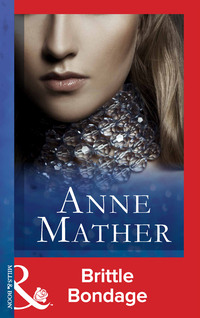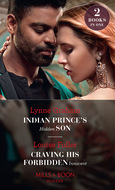Kitap dosya olarak indirilemez ancak uygulamamız üzerinden veya online olarak web sitemizden okunabilir.
Kitabı oku: «Brittle Bondage»

Mills & Boon is proud to present a fabulous collection of fantastic novels by bestselling, much loved author
ANNE MATHER
Anne has a stellar record of achievement within the
publishing industry, having written over one hundred
and sixty books, with worldwide sales of more than
forty-eight MILLION copies in multiple languages.
This amazing collection of classic stories offers a chance
for readers to recapture the pleasure Anne’s powerful,
passionate writing has given.
We are sure you will love them all!
I’ve always wanted to write—which is not to say I’ve always wanted to be a professional writer. On the contrary, for years I only wrote for my own pleasure and it wasn’t until my husband suggested sending one of my stories to a publisher that we put several publishers’ names into a hat and pulled one out. The rest, as they say, is history. And now, one hundred and sixty-two books later, I’m literally—excuse the pun—staggered by what’s happened.
I had written all through my infant and junior years and on into my teens, the stories changing from children’s adventures to torrid gypsy passions. My mother used to gather these manuscripts up from time to time, when my bedroom became too untidy, and dispose of them! In those days, I used not to finish any of the stories and Caroline, my first published novel, was the first I’d ever completed. I was newly married then and my daughter was just a baby, and it was quite a job juggling my household chores and scribbling away in exercise books every chance I got. Not very professional, as you can imagine, but that’s the way it was.
These days, I have a bit more time to devote to my work, but that first love of writing has never changed. I can’t imagine not having a current book on the typewriter—yes, it’s my husband who transcribes everything on to the computer. He’s my partner in both life and work and I depend on his good sense more than I care to admit.
We have two grown-up children, a son and a daughter, and two almost grown-up grandchildren, Abi and Ben. My e-mail address is mystic-am@msn.com and I’d be happy to hear from any of my wonderful readers.
Brittle Bondage
Anne Mather

MILLS & BOON
Before you start reading, why not sign up?
Thank you for downloading this Mills & Boon book. If you want to hear about exclusive discounts, special offers and competitions, sign up to our email newsletter today!
Or simply visit
Mills & Boon emails are completely free to receive and you can unsubscribe at any time via the link in any email we send you.
Table of Contents
Cover
About the Author
Title Page
CHAPTER ONE
CHAPTER TWO
CHAPTER THREE
CHAPTER FOUR
CHAPTER FIVE
CHAPTER SIX
CHAPTER SEVEN
CHAPTER EIGHT
CHAPTER NINE
CHAPTER TEN
CHAPTER ELEVEN
CHAPTER TWELVE
CHAPTER THIRTEEN
CHAPTER FOURTEEN
Copyright
CHAPTER ONE
RACHEL poured herself a second cup of coffee, and tried not to be aware that her daughter was scowling at her across the width of the pine kitchen table. The postman had just been, so she could distract herself by pretending to study the bills and circulars that made their regular flight through her letterbox. Well, only one bill this morning, she saw with some relief, running her thumb under the flap of the plain brown envelope. Her eyes widened at the sum the electricity company was demanding, and she made a mental note to ask Daisy to be more economical in her use of lights and heating in future. Her daughter seemed to think it was perfectly natural to turn on every utility in the house as soon as she got home. Rachel had lost count of the number of times she had gone into Daisy’s bedroom and found the television running in her absence. She couldn’t even take a shower without leaving sound and vision on.
‘You’re not really going to marry him, are you, Mum?’
Abandoning the sullen silence she had maintained all through breakfast, Daisy propped her elbows on the table and assumed a pleading look. Evidently she had decided that silence would get her nowhere. A more constructive approach was needed, and she didn’t have a lot of time.
‘Aren’t you going to be late?’ Rachel responded obliquely, unwilling to get into another argument, when there was no time to pursue it. ‘Oh, and remember to take your trainers out of the bathroom. It’s just as well they weren’t muddy. The last time you went running——’
‘Mum!’ Daisy’s tone was urgent now. ‘You can’t just not talk about it.’ She paused. ‘If you are thinking of marrying Mr Barrass, don’t you think I should be asked my opinion? I don’t want to go and live at that gloomy old place. I like living here. This is our home.’
‘I know that,’ Rachel sighed. ‘But, unfortunately, we can’t always do what we want. Besides, this house is too big for just the two of us, Daisy. And obviously Simon can’t move in with us.’
‘Why can’t he?’
‘You know why.’ Rachel picked up her cup and carried it to the sink. ‘Kingsmead isn’t just Simon’s home. It’s a working farm.’ She took a breath. ‘And in any case, this house belongs to your father. I don’t think he’d be too enthusiastic about another man moving in.’
Daisy hunched her shoulders. ‘Have you told Daddy what you’re going to do?’
‘No.’ Rachel turned away and ran some hot water into the sink. She had wondered if Daisy might have mentioned Simon on her last visit with her father, but evidently Daisy had hoped that if she didn’t mention it, it might all go away.
‘Why not?’
Rachel steeled herself not to make some comment she might later regret, and turned back to her daughter. ‘Daisy, we can’t talk about this any more now. I suggest you go and wash your hands and collect your school bag. The bus will be here soon, and you don’t want to miss it.’
Daisy sniffed. ‘I don’t care,’ she muttered, making no attempt to do as she had been told. At nearly nine years of age, she was just beginning to show some independence, and Rachel thought it was a pity she had taken a dislike to Simon before she’d really had a chance to get to know him.
‘Go and get ready now,’ she ordered, suppressing the impulse to try and reason with her once again. And, although Daisy still looked mutinous, she responded to the tone of her mother’s voice. But, it was obviously going to take some time to convince her that moving to Kingsmead would be best for all of them. Yet Daisy needed a father, and Simon was an ideal candidate for the job.
And, thinking of Daisy’s father reminded Rachel of the other unwelcome task she had to do today. At some point, she was going to have to ring Ben and tell him what she intended to do. And ask for a divorce, she acknowledged tensely. She’d never thought she’d be the first to say that.
Daisy came back into the room wearing her navy school coat and carrying her duffel bag. Whatever happened to satchels? thought Rachel ruefully, realising anew how her daughter was growing up. When she was her age, she’d been considered a child and nothing more. Daisy was a young adult, with all the doubts and hang-ups of an adolescent.
‘Ready?’ Rachel tried to instil some optimism into her voice, but Daisy was in no mood to respond to it.
‘As if you care,’ she mumbled, digging into her pockets for the fingerless gloves she’d brought back from London on her last visit. ‘Oh, Miss Gregory asked me to give you this,’ she added, discovering a slip of paper advertising for helpers for a jumble sale there was to be held at the school. ‘As you helped last year, she thought you might want to help again. I told her you’d probably be too busy, what with Mr Barrass and everything, but Miss Gregory said to tell you anyway.’
Rachel’s mouth turned down at the corners. She didn’t believe for one moment that Daisy had been discussing her affairs with her teacher. Particularly not anything that involved Simon Barrass. As with her father, Daisy chose to bury her head in the sand and hope the problem would go away. She was just trying to provoke her mother, and it was simpler to play along.
‘Oh? What did Miss Gregory say to that?’ Rachel enquired now, and had the doubtful privilege of seeing her daughter’s face suffuse with colour.
‘I don’t remember,’ muttered Daisy sulkily, going into the hall and peering out of the window. ‘Here’s the bus. I can’t talk now. I’ve got to go.’
Rachel kissed her daughter goodbye and watched as Daisy ran down the path, and climbed aboard the yellow minibus, which would take her to her private school in Cheltenham. There was a primary school in the next village, but it had been Ben’s idea to send Daisy to Lady’s Mount Academy and, as he was paying, Rachel had found it difficult to object. Besides, around the time Daisy was starting school, there had been rumours that the school in nearby Lower Morton was going to close. The fact that it hadn’t, yet, was no surety that it wouldn’t in the future. And Daisy was happy at Lady’s Mount, even if it was going to be harder to get her there once they had moved to Kingsmead.
Closing the door, Rachel paused a moment to look around the pleasant entrance hall of the house. Panelled in oak, with exposed beams and an inglenook fireplace, it had been the first thing that had attracted them to the house seven years ago. And, even after everything that had happened, Rachel knew she would miss the place terribly when they moved. It was such a friendly house, warm and south-facing, with plenty of room for the expanding family they had planned when they came to live here. Now, she and Daisy rattled around like peas in the many spacious rooms, and for all her many misgivings, it was time they moved on.
Refusing to get maudlin about it, Rachel dried the few breakfast dishes she and Daisy had used, and then ran up the dog-leg staircase to put on a little make-up. She didn’t use much—just a touch of eyeshadow and a smear of blusher. And a coat of amber lipstick, to go with the tawny highlights in her hair.
A door opened from the stairs, at the point where the small landing created the right angle. Beyond the door was a room set into the eaves of the adjoining garage, with a partially sloping roof, and wide dormer windows.
Although she didn’t really have the time to waste, Rachel opened the door on to what had been Ben’s study, and stood for a few moments looking in. When Ben moved his desk out, she had moved a work table in, intending, at that time, to use the study as a sewing-room in future. But she never had. Such sewing as she did do, she did in the family-room downstairs, and, apart from looking emptier than it used to do, the room was much the same as when Ben had worked there. His books were gone as well, of course, and the hi-fi system he’d sometimes played while he was working. Now it was just a junk-room really, not an office at all. There was no lingering trace of Ben’s occupancy. A conscious choice on her behalf.
All the same, she knew she would find it a wrench parting with the house. Although Ben had insisted she live in it after the separation, she was fond of the place. But it was still Ben’s house. She was still Ben’s wife. And that was something else she had to deal with. As Simon had said, the sooner the better.
A watery sun appeared as she was leaving. So far it had been a wet spring, and although the daffodils and crocuses were out they were all waterlogged in their beds. At the weekend, she’d have to make an effort to prune the roses, she thought, passing the prickly patch of bushes on her way to the garage. And the greenhouse needed cleaning, if she hoped to grow any decent tomatoes this year.
Except that she wouldn’t be cultivating the greenhouse this year, she reminded herself. Simon had suggested she should move into one of the tied cottages on the farm, while they were waiting for her divorce to be final and they could get married. It was more sensible, he said, pointing out that it took him a good twenty minutes to get to Upper Morton, where she lived, and a further twenty minutes to get back.
‘Just think of all the petrol I’ll save, when I can walk home after seeing you!’ he had exclaimed, and although he had smiled when he said it, she didn’t really know if he was serious or not.
In any event, there were other advantages as well. Not least the fact that she wouldn’t have the upkeep of this house making a drain on her wages. Simon had said she could live at the farm rent-free, and she couldn’t deny that lately keeping their heads above water had become a constant strain.
She could have asked Ben to increase her allowance—the allowance she got for Daisy, and which was far more generous than the upkeep of one small girl warranted—but she had her pride. If she could have afforded it, she would have supported Daisy herself. But it wasn’t fair to expect Daisy to suffer, just because her mother had some misguided desire for independence. It was Ben who had betrayed his family; Ben who had destroyed their marriage. He deserved to pay something for the privilege. The fact that what he did pay her hardly made a dent in his small change shouldn’t concern her. Until now they had had the house, and just enough to live on. If Ben felt any emotion at her changing circumstances, it should be one of relief. After all, it would be to his advantage if she didn’t have to rely on him for anything.
But, as she drove through the stone gateposts that marked the boundaries of Wychwood, Rachel couldn’t help the unwilling thought that Ben was unlikely to see it that way. He was amazingly possessive when it came to his daughter, and she doubted he’d take kindly to the thought that some other man was going to take his place in their lives. He hadn’t put up any opposition when she had applied for custody of Daisy, and he had been charitably disposed to allow her to make what visitation rights she thought fit. But that had been two years ago, when, so far as Rachel was concerned, there had been no one else on the horizon. How Ben would react to the news of Simon’s entry into their lives was anyone’s guess, but Rachel doubted he would applaud the fact that she was upsetting Daisy’s life once again.
Well, that wasn’t her fault, she told herself now, turning out of Stoneberry Lane and driving swiftly through the village. Upper Morton was the twin of its rival, Lower Morton, and when she and Ben had first seen the two villages they had been hard pressed to choose between them. They had just known they wanted to live in this part of Gloucestershire, and finding the house of their dreams had seemed to seal their fate.
And it had, thought Rachel ruefully, though definitely not in the way they had envisaged. After all, they had been happy in the beginning. Ecstatically so, considering the gamble they had taken, when they didn’t always know how they were going to pay the mortgage.
But it had been so different from the flat they had lived in in London, with a garden for Daisy to play in, and lots of room for Ben to work without being disturbed. Room for their family to grow, too, although that hadn’t happened. Would things have turned out differently if she had been able to have another baby? Would Elena Dupois have come into their lives, if Rachel hadn’t decided to go back to work?
It wasn’t as if they had needed the money. By that time, Ben had had his first advance on the novel he had written about the Falklands War. His agent was already talking about overseas sales and film rights, and Ben was writing furiously, completing his second manuscript.
Rachel had sometimes wondered if the enormity of Ben’s success had in any way contributed to her proven inadequacies. If his first attempt to write a political thriller hadn’t had such immediate appeal, would she have examined her own defeats so minutely? She hadn’t been envious of Ben, but she had felt inferior to him. A feeling she had never experienced when he was a journalist, working for a national daily, and she had been straight out of art school, training with one of the larger auction houses in the West End.
It was pointless going over all the old arguments at this stage. Pointless remembering how shattered she had been when she had miscarried for the second time. There was nothing wrong with her, the doctor had assured her. His suggestion was that she should wait a few months and then try again. But Rachel had refused to do it. She had been too distressed, too drained, too afraid of what it was doing to her own self-esteem to risk another pregnancy. When Ben attempted to persuade her, she accused him of having no feelings; when she told him she wanted to find a job, he accused her of being jealous.
She supposed that was the turning point in their marriage. Ben assumed that being his wife was not enough for her, and she had no convincing answer. She couldn’t explain her feelings. Not to his satisfaction, anyway. A yawning rift opened between them, and Ben was left to draw his own conclusions.
And that was when Elena Dupois came on the scene. Obviously, Ben couldn’t look after Daisy while Rachel was at work, so they advertised for an au pair. Elena answered the advertisement. She had been working for a family in Cheltenham who were moving away, and as she wanted to stay in the district she was able to take up the post immediately.
Rachel’s lips tightened. She supposed she should have seen the writing on the wall. Elena was younger than she was and prettier than she was, and from the very beginning she hadn’t tried to hide her admiration for Ben. It was ‘Monsieur Ben says this’ and ‘Monsieur Ben says that’ until Rachel wanted to scream that ‘Monsieur Ben’ wasn’t the only person who lived in the house.
But she was good with Daisy, and, as her daughter was doing now, Rachel had tended to bury her head in the sand. She hadn’t wanted to see what was happening under her very eyes. She hadn’t wanted to believe that Ben was cheating on her with the doe-eyed French girl.
Until that morning when she had arrived home unexpectedly and found them in what could only be described as ‘compromising circumstances’. Even now, two years later, Rachel could still feel the cold horror she had felt then. She’d felt sick, nauseated; she’d wanted to run away and hide, and come back later, when she could pretend it had never happened. But, instead, she’d disgraced herself completely by throwing up all over the bathroom floor. Her ignominy had been complete when it was Ben himself who cleaned her up and guided her into their bedroom, so that she could lie down for a while. With only a towel to cover his nakedness, she remembered. It was only later she had decided she wanted to kill him.
Of course, he’d tried to talk to her, to explain that if Elena was pregnant—as she claimed—it was nothing to do with him. He’d blamed Elena—Rachel—anyone but himself. It wasn’t what she’d thought, he’d yelled, losing his temper completely when she’d refused to listen, but if he had decided to have an affair—which he hadn’t, he insisted—she’d have only herself to blame.
Which had been a bitter reminder that it was months since they had made love. Afraid of getting pregnant again, Rachel had been unwilling to take any chances. Even his suggestion that she should leave the precautions to him had met with a tearful refusal. In her misery, Rachel had insisted on keeping him at a distance, and perhaps it was her fault that he’d found solace with someone else.
Ben had moved out the next week. Rachel didn’t know that until later. She had gathered up a few of her belongings, and her daughter, and left for London that afternoon. She and Daisy—who had happily regarded the trip as an unexpected holiday—had spent the next two weeks with Rachel’s widowed mother in Kensington. Rachel had used the time to think and plan for the future, only returning to Wychwood when she had been sure of what she wanted to do.
What she had not expected was that Ben should have moved out. After all, the house was his. She had contributed nothing to it, and he had every right to stay there. On top of which, it was obviously much too big for her to maintain on the salary she got from Mr Caldwell, the local antiquarian. Daisy would miss it, it was true, but in Rachel’s opinion they had no choice but to sell.
However, in this instance, Ben had proved decidedly obdurate. After a letter from her solicitors, laying out the situation as she saw it, he had arrived at Wychwood one cold November afternoon, and proceeded to inform her that if she chose to obstruct the arrangements he was making for his daughter’s future, he would oppose the order she was making to obtain custody of the child. He had no intention, he said, of allowing her misplaced bitterness to foul up his daughter’s life, as it had fouled up his own. She would stay at Wychwood, because that was what he wanted, and he would maintain its upkeep, just as he had done in the past. She was a selfish, self-centred woman, he had added, but he was prepared to accept that Daisy would probably be happier with her.
Privately, Rachel had thought that it probably suited him not to have the responsibility for a seven-year-old. To all intents and purposes, he was a free man; a wealthy man, moreover, whose reputation as a writer and an historian was growing in leaps and bounds. What she couldn’t understand was why he didn’t want a divorce. In his position, she was sure she would have.
But perhaps it had suited him, too, to have an absentee wife and daughter in the background. On the one hand, it proved his masculinity, if any proof were needed. And, on the other, it prevented him from getting embroiled in any other serious relationships. There had been several women mentioned in connection with him in articles she had read since they separated. Though Elena Dupois had never figured in any of these articles. He had evidently lost interest in her once the novelty of having sex with a girl half his age had worn off, and the baby she had presumably had was never mentioned.
Perhaps it had been adopted. Perhaps he was maintaining it and Elena somewhere else. Rachel told herself she didn’t want to know. As far as she was concerned, that period of her life was over.
Rachel had sometimes wondered what Daisy really thought of their separation. The explanation she had been given—that Mummy and Daddy had each decided they needed more time to themselves—had sufficed when Daisy was younger, but latterly she had begun to question the reasons why they chose to live apart. This had been especially evident since Simon Barrass had come into their lives. Daisy made no secret of her dislike for the burly farmer, and she had even gone so far as to ask why, if her mother needed a man’s company now, she didn’t just ask her father to come back and live with them.
Sometimes, Rachel wished Daisy had been older when she and Ben split up. It would have been so much easier if she could have explained what had happened, and why the separation had taken place. As it was, she was obliged to deal in euphemisms and half-truths, balancing the need for honesty with her daughter’s fragile expectations.
Which brought her back to the prospect she still faced of telling Ben what she planned to do. Had she really hoped Daisy might have prepared the ground for her? After all, Simon had been around for some considerable time, and Daisy spent one weekend every month with her father.
The arrangement had been worked out by Ben, of course. Every four weeks—and more frequently during school holidays—a car arrived to collect Daisy and her belongings from Wychwood, and transport her to Ben’s luxurious town-house in Elton Square. Usually there was a uniformed nanny in attendance, who took care of the little girl’s personal needs while she was staying with her father. And kept her out of his way, on those occasions when he had guests, or went out to dine, thought Rachel ruefully. These days, Ben’s company was much in demand at literary gatherings, Press launches and the like. Rachel knew this, because she still cut out every article she found about him from newspapers or magazines. It was a fruitless exercise, she knew, and one which she told herself she was only doing for Daisy’s sake. But the fact remained that she still felt an unwilling twinge of pride every time she saw his name in print. After all, she had recognised his talent even before he’d recognised it himself. It had been her idea that he should take a chance and give up his regular job, and try for the thing he most wanted. That he had been so successful was all due to him, of course, but without her encouragement he might never have taken the plunge.
She was so engrossed with her thoughts that she almost drove past the small antiques shop where she worked. Mr Caldwell’s establishment was an attractive double-fronted dwelling that sat squarely in the High Street, with a post office and general dealers on one side of him, and the doctor’s surgery on the other. With its bow windows and leaded panes, it invited inspection, and Mr Caldwell always made sure they had some unusual item in the window to encourage would-be customers to come inside. At present, an eighteenth-century tripod table had pride of place, with a Chinese ormolu clock set squarely on its mahogany surface. Mr Caldwell liked to create a gathering of matching pieces together, which was why there was a pair of Queen Anne chairs standing at either side of the table, though it was obvious to an experienced eye that the chairs were not in the same class as the table. Rachel had learned that an experienced eye was worth more than a dozen reference books, and it was her aptitude for seeking out a bargain that had persuaded Mr Caldwell to take her on in the first place.
Now, Rachel parked her Volkswagen at the back of the shop, and, after making sure it was locked, she crossed the yard to the rear entrance. Mr O’Shea, who restored many of the scratched and damaged items of furniture Mr Caldwell bought to a convincing originality, was already at work in the warehouse that adjoined the shop. A cheery individual, he always had a smile and a friendly word for Rachel, and today was no exception.
‘Spring is on its way,’ he announced, with sturdy conviction. ‘So why are you looking so troubled, lassie? That old besom hasn’t been complaining again, has he?’
‘Oh, no.’ Rachel cast a guilty glance towards the front of the building, but her lips twitched in spite of herself. ‘And you shouldn’t say such things, Mr O’Shea. Do you want to get me into trouble?’
‘Away with ye, lassie. He’ll not be parting with you in a hurry. You’re too valuable to him, Rachel, and that’s a fact. You’ve got a good eye. Aren’t I always telling you so?’
‘You’ve got the gift of the gab,’ retorted Rachel drily, admiring the finish he was putting to a figured walnut chest. ‘Is this that Queen Anne chest that Cyril found in Worcester? It’s beautiful. You’ve done a lovely job on it.’
‘Ah, so there you are at last, Rachel.’
Her employer’s voice put an end to her conversation with Mr O’Shea, and, following Mr Caldwell into the cramped passageway that led through to the front of the shop, Rachel reflected, not for the first time, that any fire inspector who examined this place would probably close it down as a fire hazard. Every spare inch of space was covered with crates and boxes of china, while framed portraits and uncut canvases were a constant threat to her legs and ankles.
But, for all that, Rachel loved her job. She loved the smell and the touch of old things, and, it was true, she felt she did have a certain aptitude for the work. The arts degree she had left college with might have seemed important at the time, but it was the innate ability she possessed to recognise shape and colour, and a memory for detail, that had impressed her present employer. In the five years she had worked for Cyril Caldwell, she had proved her worth again and again, which was why she knew he wouldn’t be pleased to hear she was planning to get married again. Cyril liked to feel he had her whole and undivided attention.
Rachel was wondering whether she ought to break the news to him now, before it filtered down through the grapevine that operated so efficiently between the villages, when Mr Caldwell spoke.
‘I have to go out,’ he said, leading the way into the showroom. ‘I’ve just heard that there’s a group of Meissen figurines among all that junk they’re selling out at Romanby, and I want to get there and take a look at them before Hector Grant gets his hands on them all. You can manage here, can’t you? I thought you might unpack that box of glassware, if you have the time. And there’s some discrepancy in those figures Parkers sent us. You might have a look at those, too.’
Rachel hesitated. ‘Well——’ This might not be the most appropriate time, but she wondered if it wouldn’t be easier on her to give Cyril her news when he didn’t have the time to argue. ‘I did want to have a word with you——’
‘Later, Rachel, hmm?’ But it wasn’t really a question. He was already consulting the watch he kept in his waistcoat pocket, mentally calculating the time it would take him to get to Romanby Court, and checking that he had his cheque-book and catalogue in a safe place.
‘OK.’
Rachel decided not to push it. There was no guarantee that her news wouldn’t delay him anyway, and she had no wish to be the excuse he would give if he didn’t happen to acquire any of the Meissen figures.
Ücretsiz ön izlemeyi tamamladınız.








